By Jonathan Miller, on Wed Sep 21, 2011 at 8:30 AM ET For my column this week in The Huffington Post, I draw upon a seminal childhood memory — sparked by my recent trip to Europe — to comment on a subject of great personal and religious import: the security and survival of the State of Israel.
I also offer President Obama some advice on how to address President Mahmoud Abbas’ current efforts to force a United Nations vote on Palestinian statehood.
Here’s an excerpt:
As I gaze out my airplane’s window, across the runway of Munich’s International Airport, I flash back to my childhood, and am reminded of what truly is at stake today for my ancestral homeland of Israel.
Early memories can leave indelible marks. My teenage daughters, and many of their generation, will forever be influenced by the events of 9-11. Younger Boomers found their worldviews permanently transformed by the assassinations of the sixties, of Kennedys and King.
My seminal memory is of the 1972 tragedy that transpired on another runway in Munich. The halcyon harmony of the Olympic Village was ravaged by hooded terrorists who brutally murdered eleven Israeli athletes — nine of them on a Munich tarmac — through a hail of gunfire and grenades, as a global television audience prayed in vain for their rescue.
The 1972 Summer Olympics in Munich were supposed to be a transcendent moment for the Jewish people: A penitent Germany symbolically renouncing its Nazi past; while a proud American Jew, Mark Spitz, set standards for swimming that were only recently surpassed by Michael Phelps.
Instead, Jews around the world were vividly reminded of the fragility of their newfound security. And a young boy in Lexington, Kentucky began to understand what being Jewish really meant.
Click here to read the full column in The Huffington Post.
By Kathleen Kennedy Townsend, on Tue Sep 20, 2011 at 8:30 AM ET  By 2060, the Americas are projected to have a larger population than China, so shouldn’t we direct more attention to our southern neighbors? By 2060, the Americas are projected to have a larger population than China, so shouldn’t we direct more attention to our southern neighbors?
A great nation defines itself not by what it fears and opposes but by what it believes in and champions. This year is the 50th anniversary of the Alliance for Progress, President Kennedy’s visionary effort to promote social justice and economic development in Latin America. The Alliance had a short ten-year life, but its influence was real, and its vision of the Americas is still relevant today.
The Alliance was a wager on the capacity of progressive democratic governments to carry out a peaceful revolution with the help of political support and carefully designed economic assistance.
The idea for the Alliance grew from my uncle’s capacity to listen to the leaders of Latin America, and from his openness to what he heard. The leaders said, “The United States in all its power and wealth and influence should be our partner as we build a more just society for all our citizens.” They added, “This partnership must be built on respect for the values and vision of the southern hemisphere.” John Kennedy took their arguments seriously.
In launching the Alliance, he built on the work of Douglas Dillon, who in 1958 had attended a three-week meeting in Brazil as a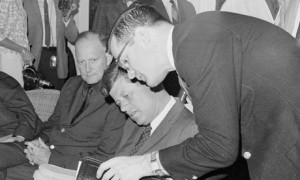 State Department employee. Dillon was impressed by Latin America leaders, particularly those from Brazil and Mexico, who were urging a new coffee agreement and a new development bank for the Americas. He eventually prevailed on President Eisenhower to take up the cause and to create the Inter-American Development Bank. He also piqued the interest of the Democratic presidential candidate from Massachusetts. State Department employee. Dillon was impressed by Latin America leaders, particularly those from Brazil and Mexico, who were urging a new coffee agreement and a new development bank for the Americas. He eventually prevailed on President Eisenhower to take up the cause and to create the Inter-American Development Bank. He also piqued the interest of the Democratic presidential candidate from Massachusetts.
As Arthur Schlesinger recounts it, Senator Kennedy read a memorandum from ten leading Latin American economists, and, impressed with the urgency and energy of their ideas, conceived of a new approach to inter-American development.
He had an idea but no name.
Read the rest of…
Kathleen Kennedy Townsend: Renewing the U.S.-Latin American Alliance For Progress, 50 Years Later
By Chris Schulz, RP Staff, on Fri Sep 16, 2011 at 1:30 PM ET The Politics of the Planet A California study actually looks at the potential dollars lost at various beaches because of rising sea levels. [latimes.com]
As technology changes the demand for earth metals rises and some are becoming rare and others are mined in politically dubious areas. As prices go up, recycling technology should improve. [bbc.co.uk]
The first balloon to test man-made solutions to climate change set to launch in the UK. [bbc.co.uk]
What do South Carolina and Michigan have in common? They are the only two US States that have not had a disaster declared. [npr.org]
By Jonathan Miller, on Thu Sep 15, 2011 at 1:00 PM ET 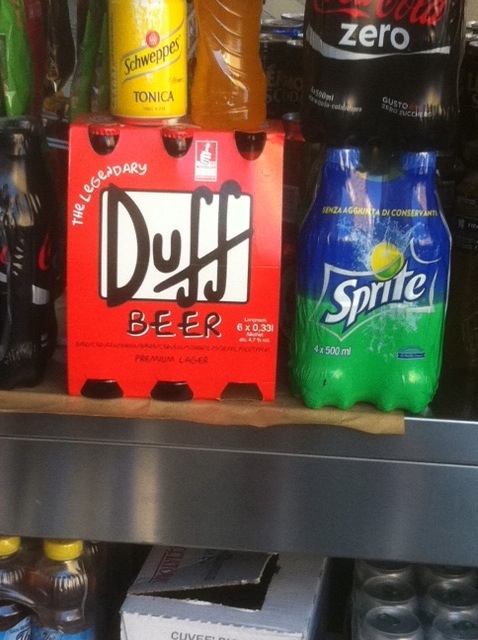
At some point, I will give our loyal readers a full and mostly serious account of my amazing journey through Italy this past week.
But first, let me share my most two overwhelming impressions, of beer and Pisa.
First, beer. See the picture above. There really is Duff beer. It’s not just for Homer anymore. (And wasn’t the original Homer Greek, not Roman?)
Second, Pisa. It was absolutely amazing to see the Tower of Pisa (which is a lot smaller in person than you imagine, just as Michaelangelo’s David is a lot bigger). What an incredible thrill it was to stand in the same place where Galileo and Rick Perry dropped the pizza to disprove the scientific community’s misplaced faith in global warming and a round earth! Quite humbling.
But just like climate change and rough earth theory, the so-called “Leaning” Tower of Pisa is just yet another conspiracy. Check out the picture below. The Tower and I are perfectly straight, while the rest of Pisa leans to the right.
Another tragic myth perpetuated by the mainstream media, debunked exclusively here for the RP Nation.
You are welcome!
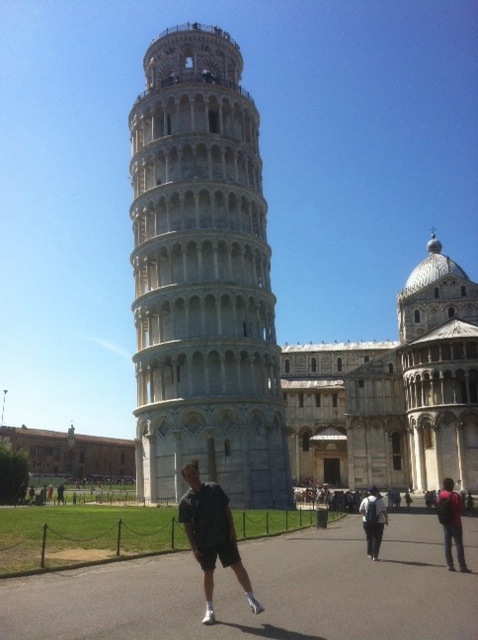
By Jeff Smith, on Thu Sep 15, 2011 at 8:30 AM ET 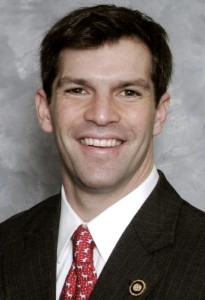 Sorry, but the die is cast here. Dick Cheney was the Bush administration’s most powerful proponent of a decade of failed wars of choice that cost our nation dearly in prestige, treasure, and most lamentably, blood. Two-thirds of the country strongly agrees with that sentiment. Sorry, but the die is cast here. Dick Cheney was the Bush administration’s most powerful proponent of a decade of failed wars of choice that cost our nation dearly in prestige, treasure, and most lamentably, blood. Two-thirds of the country strongly agrees with that sentiment.
He was the guy who argued that “deficits don’t matter” even as the tax cuts he relentlessly pushed exacerbated our already-difficult fiscal situation that every demographer (and most policymakers) understood would become perilous upon baby-boomer retirement.
In every major policy area in which he was involved, Dick Cheney was dead wrong – and many of his co-partisans actually agree with that assessment. If he thinks it will help him now to trash the people (I.e., Rice, Cheney) who at various junctures made rather ineffectual attempts to slow the train of destruction he conducted, he is sorely mistaken.
(Cross-posted, with permission of the author, from Politico’s Arena)
By Chris Schulz, RP Staff, on Fri Sep 9, 2011 at 1:30 PM ET
Amidst hurricane season a wildfire is ravaging Central Texas.[yahoo.com]
Obama must make a difficult decision about the future of US energy. Opening more land to drilling will create jobs and energy but will anger environmentalists. [cnn.com]
Soon the controversial ‘shark fin soup’ may be banned in California over concerns of dwindling numbers of sharks. [latimes.com]
A South African plant evolved a perch, in order for birds to aid in its fertilization. [bbc.com]
By Chris Schulz, RP Staff, on Fri Aug 26, 2011 at 1:30 PM ET
Some FAQ’s about the recent earthquake answered. [cnn.com]
New technology for fishermen can help to protect marine species while at the same time not hampering the fishermen’s ability make a living and put fish on our table. [nytimes.com]
Two interesting maps about the effects of climate change thus far. [latimes.com]
State Fairs across the country typically receive exposure for their unusual, deep-fried and unhealthy meals. Kentucky is one upping every other state by banning bicycles from the fairgrounds. Now you cannot even shed some calories on your ride home after eating the deep-fried Twinkie. [brokensidewalk.com]
By Chris Schulz, RP Staff, on Fri Aug 19, 2011 at 1:30 PM ET
Going green means more than just saving the Earth for the military, it means saving lives. [cnn.com]
Poaching is a problem in developed countries as well. [bbc.com]
As some species like the Swedish wolf are threatened or endangered, other species are newly discovered. [bbc.com]
A new way to travel between cities that is cheap and green. [latimes.com]
By Kathleen Kennedy Townsend, on Tue Jul 26, 2011 at 8:30 AM ET  In an earlier piece, I talked about the breakdown of our infrastructure based on my experience with the Washington DC Metro: the broken escalators, the slow Orange line, the unscheduled stops in the middle of tunnels. In an earlier piece, I talked about the breakdown of our infrastructure based on my experience with the Washington DC Metro: the broken escalators, the slow Orange line, the unscheduled stops in the middle of tunnels.
Today I’d like to add my complaints about the Maryland Area Regional Commuter line, MARC, where delays are not uncommon, and Amtrak’s Acela, which sustained a speed of 0 mph for two straight hours in New York’s Penn Station during one of my recent trips.
I choose the quiet car, because I don’t want to hear the curses that greet one delay after another. But then I think, Is passivity really the American way? Aren’t we supposed to take action, do something, get the job done? Americans solve problems. What’s going on when I read that China is launching a new line of fast trains and we aren’t even able to get our slow trains going?
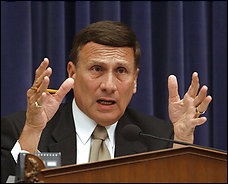 Congressman John Mica So I took it personally when Congressman John Mica, a Florida Republican and head of the House Transportation and Infrastructure Committee — rather than embracing the idea of an infrastructure bank that had the backing of John Kerry (Democrat) and Kay Bailey Hutchinson (Republican), the Chamber of Commerce, and the AFL-CIO — proposed to decrease infrastructure funding even beyond what Paul Ryan had proposed. Mica wants a 40 percent cut, to outdo the Tea Party’s cut of 30 percent.
The Republicans say they want to create jobs. But making it difficult to get to work is not the right path. And it’s tough get a job when you can’t get to an interview on time. On the delayed Acela, one of my fellow passengers complained (despite being in the quiet car) that he was going to miss his meeting with a potential client. As we sat in the station, unmoving, he became increasingly agitated and depressed. “In this bad economy, I really can’t afford not to meet him,” he said.
Read the rest of…
Kathleen Kennedy Townsend: Why Are Our Bridges Made in China?
By Chris Schulz, RP Staff, on Fri Jul 22, 2011 at 9:30 AM ET
President Obama must deal with fierce lobbying over the future of MPG standards. Naturally, American car companies do not want any standards imposed on them. Isn’t this one of the things that got them into trouble in the first place; ignoring the trends towards more fuel efficient cars? [latimes.com]
Lawmakers appear ready to end the ethanol subsidy. This long overdue measure will free up $6 billion amid a budget crisis. [npr.org]
South African researches are stunned when a shark jumps into their boat. Even more surprising is when it says “candygram”. [cnn.com]
It appears there will be justice for the environmental activists that were murdered in the Amazon. [bbc.co.uk]
Great news from Portland, more cities now need to follow suit and ban plastic bags. [msnbc.com]
|
The Recovering Politician Bookstore
|















